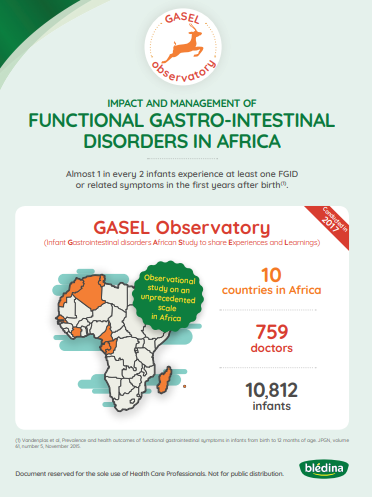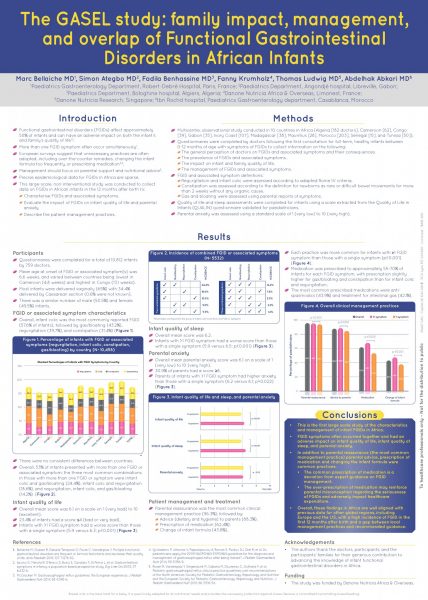A major study looking at functional gastrointestinal disorders in African infants uncovered some interesting results, helping healthcare professionals assess impact and first-intent management for patients.

GASEL (infant Gastrointestinal disorders African Study to share Experiences and Learnings) was a study initiative co-ordinated by
Dr Marc Bellaïche from the Robert-Debré Hospital, Paris, France, and professors Abdelhak Abkari (Morocco), Simon Ategbo (Gabon) and Fadila Benhassine (Algeria). The study involved 10 African nations: Morocco, Algeria, Ivory Coast, Cameroon, Tunisia, Republic of the Congo, Madagascar, Gabon, Mauritius and Senegal.
Methods and objectives
The 759 doctors who participated in the study enrolled 10,812 infants aged between 0-12 months, to assess the prevalence, characteristics, impact and first-intent management of the gastrointestinal functional disorders and symptoms encountered by their youngest patients.
The major aim of the study was to gather sufficient evidence to respond to the following questions:
- At what frequency do functional gastrointestinal disorders (FGIDs) occur in African infants?
- What range of clinical symptoms are encountered?
- What effect do FGIDs have on the child and its family?
- What do doctors propose as first-intent management?
- How do these results compare with other studies performed in Africa and other countries?
Click here to watch this video

Occurrence of FGIDs
The three FGIDs1 identified during GASEL were physiological regurgitation, colic and functional constipation with gas and/or bloating as an associated symptom. The pediatricians saw on average 35 new cases in children less than one year old, every month. The presence of FGIDs was split almost 50:50 between males and females and the average age at presentation was three months. The most frequently observed FGID was colic (>57%). While 47% of the infants presented with one FGID, 53% had multiple symptoms.
Impact on parents’ life
Interestingly, there was little difference in the parental anxiety score determined by QUALIN*2 (a 34-point questionnaire designed for use by both professionals and parents) whether children suffered from one or multiple FGIDs, but it did find that an increased number of disorders negatively impacted a child’s quality of life (p<0.001).
Pediatricians first-intent management
In terms of first-intent management, in almost all cases (>95%) pediatricians made steps to alleviate the level of parental anxiety and in 88% of cases suggestions to improve lifestyle and nutritional advice were given. However, for 62% some form of pharmaceutical intervention was proposed despite the recommendations showing that with the occasional exception of functional constipation, there is no indication for drug treatment in first-intent management and never in the case of infant colic.
A unique study
Thanks to its extraordinary scale, GASEL shows for the first time the epidemiology, impact and first-intent management of FGIDs in Africa. The proportion of infants – almost one in three – affected by FGIDs reported in GASEL approaches those found in other countries3-5. It’s worth noting that further investigation of the patients consulting in GASEL indicated a large proportion of children born by cesarean section (34.4%) and/or being fed other than by breastfeeding at the time of consultation (72.8%). Regardless of what this reveals about the current situation of childbirth and breastfeeding in Africa, it does raise the question of a possible link between the gut microbiota and FGIDs in infants6.
Click here to read the full publication.

Infography: GASEL Infographics

Publication: The GASEL Study
References
- Benninga MA, et al. Childhood functional gastrointestinal disorders: neonate/toddler. Gastroenterology. 2016; 150:1443-57
- Manificat S, et al. Evaluation de la qualité de vie du nourrisson et du très jeune enfant : validation d’un questionnaire. Etude multicentrique européenne. Arch Pédiatr. 2000;7:605-14
- Vandenplas Y, et al. Prevalence and health outcomes of functional gastrointestinal symptoms in infants from birth to 12 months of age. J Pediatr Gastroenterol Nutr. 2015;61:531-7
- Robin SG, et al. Prevalence of pediatric functional gastrointestinal disorders utilizing the Rome IV Criteria. J Pediatr. 2018;195:134-139
- Iacono G, et al. Gastrointestinal symptoms in infancy: a population based prospective study. Dig. Liver Dis. 2005;37:432-8
- Indrio F, et al. Knowledge, attitudes and practices of pediatricians on infantile colic in the Middle East and North Africa region. BMC Pediatr. 2017;17:187
BA19-485
